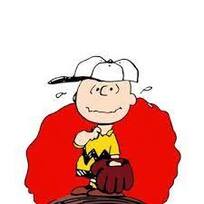
Brief synopsis: Charlie Brown enters the school spelling bee and wins, and from there it’s on to the National Spelling Bee in New York City with Snoopy and Linus in tow. The contest begins: contestants are narrowed down until Charlie and another boy remain. Charlie’s word? BEAGLE. Easy enough but Charlie misspells it BEAGEL, on national television and worse, while Lucy van Pelt is watching.
Next day, Linus visits Charlie Brown ready to resume baseball. Charlie is in bed with the lights out and the shades drawn, ‘I don’t care,’ his reply to Linus’ polite inquiries.
Then comes the telling point of the film, and why I still think the Peanuts movie rise above other children’s entertainment fare to this day.
Linus understands his friend’s depression, but says upon leaving, “But did you notice something, Charlie Brown? The world didn’t come to an end.”
And with that and after some thought, Charlie gets out of bed, gets dressed, goes outside to find that, no, the world did not come to an end. Nor will it.
Failure is difficult for everybody and especially so for those on the autistic spectrum, complicated as by autistic black-and-white thinking, perfectionism, and low tolerance of frustration. Difficulties with social interactions often increase chances of failure for the autistic individual. It’s enough to make somebody draw the shades, turn out the lights, and wish Linus would just go away.
My intolerance of failure, reversal, rejection, loss, or what have you was so intense during my younger years that I actively avoided competition of any sort—even losing a simple board game was too much.
This unfortunately carried over into other aspects of life: work, writing, family, dating, and so on. I could not accept that things in life tend not to work out the way we want, if at all. Failure was my scarlet letter F.
It wasn’t until I was older that I noticed the world didn’t come to an end whenever I misspelled BEAGLE.
I could draw the shades and turn out the lights all I wanted, but the sun would still rise, and people would get up and get dressed for the day. And they dealt with failure, too, more often than I thought. The difference was that they chose to accept setback and frustration as an inevitable part of life and the business of living, and not as a reflection of their self-worth or the injustice of the universe.
Back to Charlie Brown: other children are playing marbles and skipping rope. No mention is made of his loss. It might as well have happened a week ago or during the Cretaceous Period.
Charlie then sees Lucy with a football and tries to kick it. As usual, he misses and ends up flat on his back. Lucy, like life, welcomes him back. So what if he missed the football yet again.
The important thing is that he resumed his life. The world didn’t come to an end.
Mike Minnis is a guest blogger and client. His books can be purchased on Amazon. Visit his website at: www.michaelminnisbooks.com/index.htm
